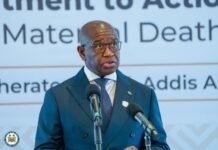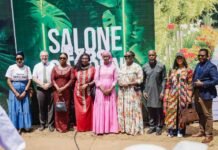By Amin Kef (Ranger)
The ongoing issuance of Biometric ID Cards by the National Civil Registration Authority (NCRA) is a significant step towards enhancing national security, improving public service delivery and bolstering economic development. For both citizens and non-citizens residing in Sierra Leone, obtaining this card is not just a formality but a necessity with wide-ranging implications.
One of the primary benefits of the Biometric ID Card is its contribution to national security. The card’s advanced biometric features, which include fingerprints and facial recognition, make it nearly impossible to duplicate or forge. This ensures that the identities of all residents are accurately verified, reducing the risk of identity theft and fraudulent activities. For law enforcement agencies, this means a more reliable database for tracking and preventing crime, thereby creating a safer environment for everyone.
The introduction of the Biometric ID Card is revolutionizing public service delivery in Sierra Leone. The card serves as a single, unified identification document that can be used across various Government services. This includes accessing healthcare, education and social welfare programs. For citizens, this means faster, more efficient service delivery with fewer bureaucratic hurdles.
For non-citizens, particularly those who are part of the expatriate community or hold work permits, it simplifies interactions with Government institutions and ensures they receive the services they are entitled to.
The Biometric ID Card is also a key tool for economic development. With a secure and reliable identification system in place, financial institutions can better verify the identities of their clients. This promotes greater financial inclusion by making it easier for individuals to open bank accounts, apply for loans and engage in other financial transactions. For businesses, this means a more robust and trustworthy environment for commerce, attracting both local and foreign investment.
In a diverse society, the Biometric ID Card fosters a sense of belonging and inclusivity. For non-citizens, having a recognized and official form of identification helps them integrate more seamlessly into the community. It ensures that their rights are protected and that they can participate fully in the social and economic life of the country. For citizens, it reinforces a shared identity and commitment to the nation’s progress.
The NCRA Centers for ID Card Application and Processing are located at:
1. NCRA Headquarters, 2 Walpole Street, Freetown
2. NCRA Office, 23B Off Kingharman Road, Freetown
3. NCRA Office, Kennedy Street, Freetown
4. NCRA Branch Office, Lumley Road, Freetown (By the Roundabout)
5. NCRA Office, Waterloo along the Freetown Highway (Opposite the Police Station)
6. NCRA Offices in the Regional Headquarter Towns of Bo, Kenema.
To increase accessibility, corporate facilities are also available. Organizations and institutions such as Ministries, Departments and Agencies (MDAs), foreign missions, financial institutions, etc., can contact the following numbers for service details:
+232-33-433-333
+232-30-500-000
+232-78-221-812
Email inquiries can be sent to idverification@ncra.gov.
The issuance of the Biometric ID Card by the NCRA is a pivotal development for Sierra Leone. It is more than just an identification document; it is a gateway to enhanced security, streamlined public services, economic opportunities and democratic integrity.
For every resident, securing this card is a step towards a brighter and more secure future in Sierra Leone. The NCRA is encouraging all citizens and non-citizens to take prompt action to obtain their Biometric ID Cards and be part of this transformative journey.
In another recent development the National Communications Authority (NatCA) has issued a directive mandating all Mobile Network Operators (MNOs) to link subscriber phone numbers to their respective National Identification Numbers (NINs).
This initiative aims to bolster national security and improve service delivery.
According to a public notice, the primary objective of this exercise is to ensure their NINs have been correctly linked to their SIMs.
The notice warns of a limited window for completing the process to enhance national security by ensuring that each SIM card in use is linked to a verified individual. This measure is expected to reduce identity fraud and other online crimes significantly. By cleaning the country’s SIM ownership database, NatCA aims to prevent criminals from exploiting multiple unlinked SIMs to conduct illicit activities.
The exercise is a collaborative effort between NatCA and the National Civil Registration Authority (NCRA).
Telecom consumers are urged to contact their service providers to verify this exercise. Progressive barring of subscribers who fail to comply will commence shortly, potentially leading to a total removal of non-compliant numbers from the Mobile Network Operators’ databases.
The harmonization of NIN-SIM is seen as a crucial step for Sierra Leone as it moves deeper into the digital economy. NatCA stresses that a unified digital identity is vital for the country’s collective progress.
NatCA has reassured citizens that it will continue to implement necessary regulatory interventions to protect them from criminal activities.
The agency’s commitment to enhancing the security of telecommunications infrastructure is evident through this new mandate.




